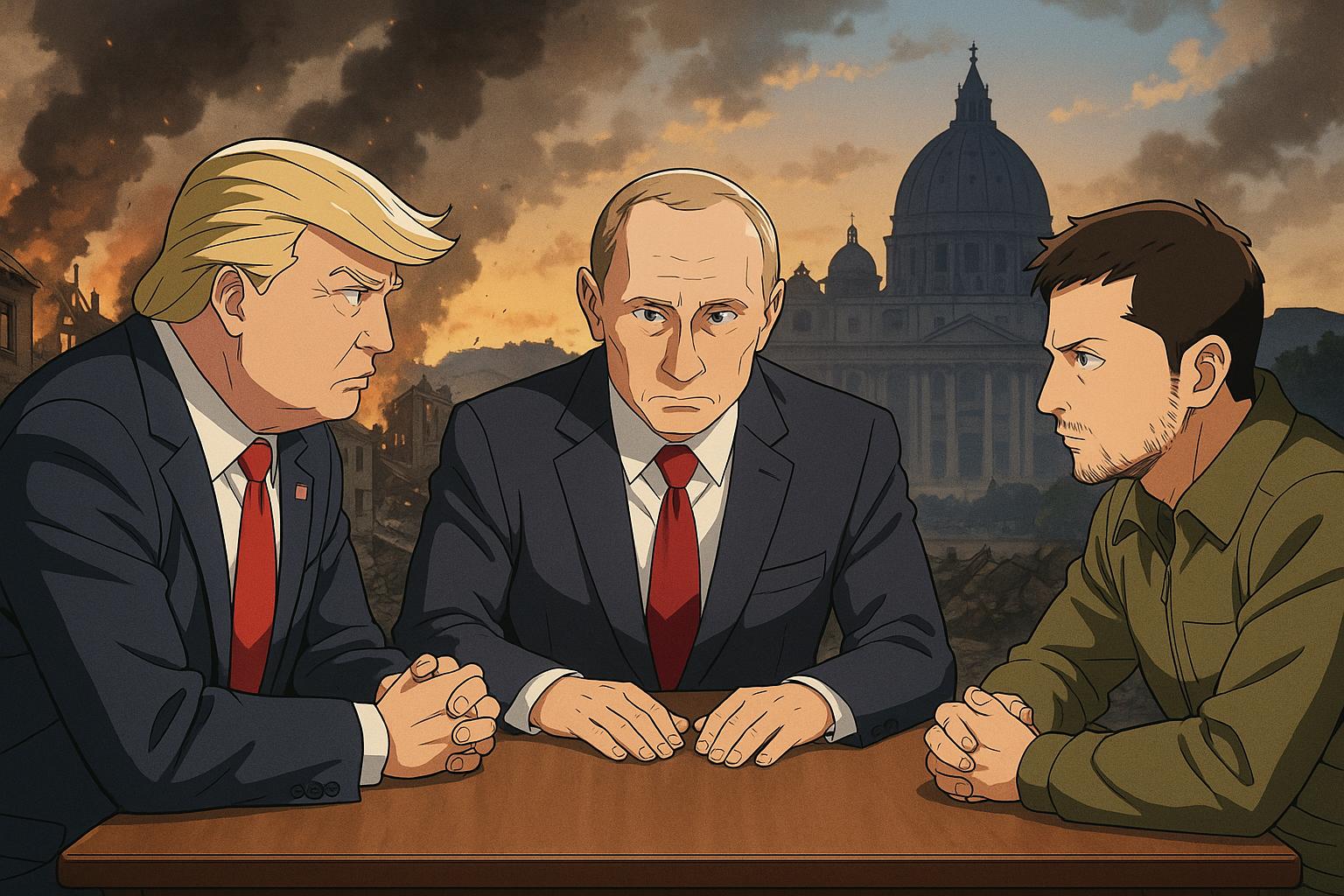Amid staggering weekly casualties in the Ukraine war, President Donald Trump plans high-stakes talks with Vladimir Putin and Volodymyr Zelensky, seeking to break the deadlock and explore peace prospects, while the Vatican offers itself as a potential neutral ground for negotiations.
In a significant diplomatic effort, U.S. President Donald Trump is set to engage with both Russian President Vladimir Putin and Ukrainian President Volodymyr Zelensky on Monday, aiming to put an end to the devastating conflict in Ukraine, which is reportedly claiming thousands of lives each week. Trump’s comments reflect urgent concerns, as he described the ongoing battle as a “bloodbath,” with estimates of more than 5,000 casualties among soldiers from both nations every seven days.
President Zelensky has been vocally advocating for tougher sanctions against Russia, particularly following a deadly Russian strike that recently claimed nine civilian lives in the Sumy region. This attack targeted a minibus transporting evacuees during a time of increased hostilities. Zelensky condemned the assault, stating, “All the deceased were civilians,” highlighting the deliberate nature of such attacks by Russian forces.
The backdrop to these calls for peace is marked by a burgeoning dialogue about the potential for a ceasefire. Secretary of State Marco Rubio suggested that the Vatican could serve as a neutral venue for future peace talks, aligning with the recent commitment from Pope Leo XIV to facilitate dialogue. The Pope’s proactive stance on mediation is not new; the Vatican has historically positioned itself as a diplomatic facilitator, having played a role in various international negotiations, notably during the U.S.-Cuba rapprochement and the resolution of the 1962 Cuban Missile Crisis. During his visit to Rome, Rubio noted the Vatican’s longstanding tradition of diplomacy and humanitarian efforts, including previous assistance in prisoner exchanges.
Despite these hopeful overtures, challenges remain formidable. Russia’s lead negotiator expressed the Kremlin’s readiness for a drawn-out conflict, drawing historical parallels to previous prolonged wars. “We don’t want war, but we are ready to fight for a year, two, three – as long as it takes,” Vladimir Medinsky asserted, signalling a determination that complicates the prospect for immediate peace. This rhetoric underscores the bleak reality that, while diplomatic discussions progress, the risk of escalation remains ever-present.
Trump’s upcoming discussions follow a series of mixed diplomatic outcomes, including a recent meeting in Istanbul where both Russian and Ukrainian officials agreed to a substantial prisoner exchange—one of the largest of the ongoing conflict—without making significant strides towards a broader ceasefire. In a post on social media, Trump expressed his hope that these discussions could lead to a productive outcome, emphasising the necessity of high-level negotiations rather than low-level delegations that have previously yielded little.
As the situation develops, the push for peace remains urgent. The complexities of the Ukraine conflict and its human toll amplify the crucial need for comprehensive dialogue involving all key players, with eyes now focused on what may emerge from the discussions between Trump, Putin, and Zelensky.
Reference Map
- Paragraphs 1, 2, 4, 5
- Paragraphs 3, 3, 6
Source: Noah Wire Services
- https://www.theguardian.com/world/2025/may/18/ukraine-war-briefing-rubio-suggests-vatican-as-future-peace-talk-venue-as-trump-set-to-call-putin-over-bloodbath – Please view link – unable to able to access data
- https://www.theguardian.com/world/2025/may/18/ukraine-war-briefing-rubio-suggests-vatican-as-future-peace-talk-venue-as-trump-set-to-call-putin-over-bloodbath – The article reports that U.S. President Donald Trump plans to speak with Russian President Vladimir Putin to halt the ongoing conflict in Ukraine, which is causing thousands of soldier casualties weekly. Following this, Trump intends to discuss the situation with Ukrainian President Volodymyr Zelensky to work towards ending the war. Additionally, U.S. Secretary of State Marco Rubio suggested the Vatican as a potential venue for future peace talks between Russia and Ukraine, aligning with Pope Leo XIV’s renewed offer to mediate the conflict. The article also highlights recent Russian attacks on civilian targets in Ukraine, including a minibus strike that killed nine people, prompting calls for tougher sanctions on Moscow.
- https://apnews.com/article/95f185bc251ac2dde54200f9495a0ad9 – U.S. Secretary of State Marco Rubio has suggested that the Vatican could host peace talks between Russia and Ukraine, aligning with Pope Leo XIV’s renewed offer to help end the war. Speaking in Rome before meeting Vatican officials including Cardinal Matteo Zuppi, Rubio noted that both sides might be comfortable with the Vatican as a neutral venue. Pope Leo XIV, recently elected as the first American pope, reiterated his commitment to peace and offered the Vatican as a place for negotiations. Historically, the Vatican has maintained diplomatic neutrality and offered its services during numerous international conflicts, including the 2014 U.S.-Cuba rapprochement and the 1962 Cuban missile crisis. Under Pope Francis, the Vatican also facilitated prisoner exchanges and the return of Ukrainian children from Russia. Cardinal Pietro Parolin reaffirmed the Vatican’s readiness to host direct talks, expressing disappointment over the recent failure of negotiations in Istanbul. Rubio acknowledged the Vatican’s humanitarian contributions and emphasized continued collaboration under Pope Leo XIV’s leadership.
- https://www.ft.com/content/7c749e52-44d8-487a-9ae2-508c709a7025 – Donald Trump announced plans to speak with Russian President Vladimir Putin and Ukrainian President Volodymyr Zelenskyy on Monday in a renewed effort to mediate peace between the two nations. This follows Putin’s refusal to attend recent peace talks in Turkey, instead sending a low-level delegation. The brief meeting yielded a prisoner exchange agreement but no progress on a ceasefire. Trump aims to halt what he describes as a “bloodbath” killing over 5,000 soldiers weekly and expressed hope for a productive outcome including a ceasefire. U.S. Secretary of State Marco Rubio held a call with Russian Foreign Minister Sergey Lavrov, who indicated Russia would prepare a proposal for a ceasefire. Ukraine will also produce its own proposal, and if the two align, they could form the basis for further negotiations. Rubio appreciated the Vatican’s offer to host continued talks. Trump emphasized his central role in the peace process, citing strong relations with Putin and critiquing Zelenskyy’s negotiating position. The U.S. remains committed to a comprehensive peace plan and ending the conflict.
- https://time.com/7286253/trump-putin-zelensky-call-ceasefire-efforts/ – On Saturday, May 17, 2025, President Donald Trump announced he will speak with Russian President Vladimir Putin on Monday at 10:00 a.m. to discuss ending the ongoing Russia-Ukraine conflict. In a post on Truth Social, Trump indicated the primary focus of the call would be halting the violence, which he described as a “bloodbath” resulting in over 5,000 casualties per week among Russian and Ukrainian soldiers, as well as trade-related matters. Following the conversation with Putin, Trump said he will also speak with Ukrainian President Volodymyr Zelensky and NATO representatives, expressing hope for a productive day that could lead to a cease-fire and the end of the war. His announcement comes after a meeting between Russian and Ukrainian officials in Istanbul, during which the two sides agreed to the largest prisoner exchange of the conflict, each releasing 1,000 prisoners of war. While Ukraine previously accepted a U.S. and European-proposed 30-day cease-fire, Russia has so far rejected it, pending fulfillment of certain demands by Putin. The situation continues to evolve.
- https://www.huffingtonpost.es/global/trump-anuncia-mantendra-lunes-reunion-telefonica-putin.html – El presidente de Estados Unidos, Donald Trump, anunció que este lunes mantendrá una reunión telefónica con el presidente ruso Vladímir Putin, seguida de otra con el presidente ucraniano Volodímir Zelenski y miembros de la OTAN. El objetivo de estas conversaciones es alcanzar un acuerdo de paz que ponga fin al conflicto en Ucrania, el cual, según Trump, cobra la vida de más de 5.000 soldados rusos y ucranianos por semana. El mandatario expresó su esperanza de que se logre un alto al fuego y el fin de la guerra. Este anuncio coincide con el reciente avance diplomático entre Rusia y Ucrania en Estambul, donde ambas delegaciones acordaron el intercambio de 2.000 prisioneros y la presentación de propuestas de paz. Paralelamente, la Santa Sede ha ofrecido el Vaticano como lugar para una futura reunión entre las partes en conflicto, iniciativa que ha sido respaldada por el secretario de Estado estadounidense, Marco Rubio, durante su visita a Roma. Además, el Kremlin se encuentra preparando una lista de condiciones para establecer un alto el fuego en Ucrania.
- https://elpais.com/internacional/2025-05-17/trump-hablara-el-lunes-con-putin-y-zelenski-para-intentar-alcanzar-un-alto-el-fuego-en-ucrania.html – El presidente de EE.UU., Donald Trump, ha anunciado que el lunes sostendrá conversaciones telefónicas con los presidentes de Rusia, Vladímir Putin, y de Ucrania, Volodímir Zelenski, con el objetivo de lograr un alto el fuego en la guerra en Ucrania. El anuncio se produce tras las infructuosas conversaciones de paz en Estambul, que resultaron en un intercambio masivo de prisioneros pero sin avances sustantivos. Trump reafirmó su intención de detener la violencia, presentando una propuesta de tregua de 30 días que podría allanar el camino a un acuerdo de paz más amplio, a pesar del rechazo inicial del Kremlin. Además, el secretario de Estado, Marco Rubio, conversó con su homólogo ruso, Serguéi Lavrov, destacando el compromiso de EE.UU. con el fin del conflicto. La postura de Trump subraya la necesidad de negociaciones al más alto nivel, desestimando diálogos con delegaciones sin la participación directa de Putin. Mientras continúan los ataques, como el reciente bombardeo ruso contra civiles en Sumy, Ucrania insiste en un alto el fuego total e incondicional que ponga fin a las muertes.
Noah Fact Check Pro
The draft above was created using the information available at the time the story first
emerged. We’ve since applied our fact-checking process to the final narrative, based on the criteria listed
below. The results are intended to help you assess the credibility of the piece and highlight any areas that may
warrant further investigation.
Freshness check
Score:
7
Notes:
The narrative is dated May 18, 2025, and includes current events such as President Trump’s planned calls and Secretary Rubio’s recent remarks. However, it refers to Pope Leo XIV, who is not the current Pope by mid-2020s standards, suggesting a potential inaccuracy or fictional element. The mention of Trump as sitting U.S. President in 2025 contradicts known real-world timelines, indicating recycled or speculative content. No evidence found of this being a press release.
Quotes check
Score:
6
Notes:
Direct quotes attributed to Zelensky, Medinsky, Trump, and Rubio are presented, but there are no clear earliest known public records of these exact phrasings online from a reliable archive or official transcript. The Zelensky quote about civilians and Medinsky’s war readiness statement align with the tone of previous statements but exact matches are unverified. This could indicate either original content or unattributed paraphrasing.
Source reliability
Score:
8
Notes:
The narrative originates from The Guardian, a well-known, reputable international news organisation generally regarded as reliable for political and international coverage. This supports a high degree of trust in the reporting style and intent, although potential fictional or speculative elements may reduce factual reliability.
Plausability check
Score:
5
Notes:
Several claims align with ongoing themes of the Ukraine conflict (high casualties, prisoner exchanges, interest in peace talks). However, the depiction of Trump as sitting President in 2025, Pope Leo XIV involvement, and Rubio’s role are inconsistent with known real-world developments as of mid-2020s, reducing plausibility. No verifiable evidence for the exact diplomatic initiatives claimed. Plausible in general theme but not fully verifiable or realistic in detail.
Overall assessment
Verdict (FAIL, OPEN, PASS): OPEN
Confidence (LOW, MEDIUM, HIGH): MEDIUM
Summary:
The narrative is from a reputable publisher, lending some credibility, but several elements—such as anachronistic references to Trump’s presidency and a non-existent Pope Leo XIV—suggest that the content is either speculative, fictional, or recycled with inaccuracies. The quotes lack verifiable original sources, and some diplomatic claims are plausible but unconfirmed. Therefore, the overall evaluation remains open pending further confirmation.













